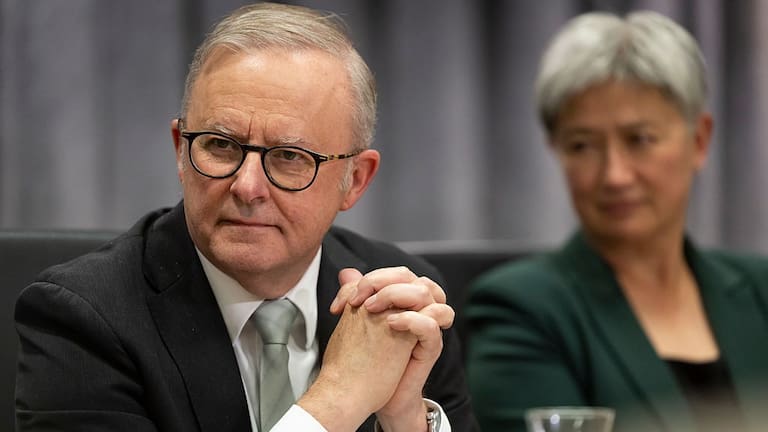Minister for Disability Issues Penny Simmonds says criticism of a funding cap for equipment for disabled people is "absolute rubbish" — and has revealed her ministry is within “days” of running out of its funding.
She claimed carers had been taking advantage of a "broad" funding criteria to use public money "for massages, overseas travel, pedicures, haircuts" for themselves.
Earlier today, Labour leader Chris Hipkins said the disability community will pay for the Government's "fiscal incompetence", with restrictions on funding for equipment and modification services.
The change — cited as due to financial pressures on Government departments — was announced by Whaikaha the Ministry for Disabled People on Monday after an email leak.
It announced it would make changes to its purchasing rules "to clarify how people can use their disability support funding”. The changes were effective immediately.
The Government has come under increasing pressure over how it would fund its tax cuts.

The leaked email — accidentally sent to the wrong recipient — said due to "financial cost pressures" on government departments, the ministry would now "actively" enforce a set budget cap on the provision of equipment and modification services.
"I wanted to notify you in advance that this is likely to result in some reduction in orders over the next few months," the email said.
Today, the Disability Issues Minister said the enforced budget caps and reductions in orders were "not cuts". Penny Simmonds said, in fact, 10% more funding was being put into the fund for equipment.
“It is a policy situation that was set up by the previous government that has seen more than double the spend occurring in the flexible individualised funding. That's put pressure on, obviously, the amount of money that was there to be able to be used and so now we have to look at how we prioritise that.. and the first instance must be prioritising that use for disabled people.”
Asked why the Government didn’t first consult with the community over the policy change, Simmonds said she understood “carers who have been using the funding for their personal care” were “upset about losing that”.
She said she would talk to Whaikaha about "how announcements are made in the future”.
"This fund has blown out and they have to manage it within the fund that’s there."
When Hipkins’ comments were put to Simmonds, she said they was "absolute rubbish".
“The government’s coffers are not an open pit. There has to be discipline around spending of government funding. The funding comes from taxpayers.

"Where there is greatest need [funding] will occur.
"Some of the funding has been going to the carers, that does need to be pulled back and prioritised to the disabled person.
"We've got such broad criteria at the moment that the funding has also been used for massages, overseas travel, pedicures, haircuts, for carers."
Simmonds, who has a child with Down syndrome, said carers had very difficult jobs but said the money was for people with disabilities.
"They must always have first priority on that money."
She said the funding had a "temporary pause" while the criteria was worked out, and the reason the policy had changed so swiftly was because the ministry was in danger of "running out of money".
"It was days that they were getting very close to. They need to be able to make that decision now. It’s a ministry that’s very close to the end of their [funding] appropriation."
The Minister said she had been aware of the problem since around Christmas time but it had fluctuated since then.
Cerebral Palsy Society calls changes 'draconian'
Cerebral Palsy Society of New Zealand spokesperson Amy Hogan, who lives with cerebral palsy, said the processes to allocate funding were fragile and broken to start with, but the policy change was "making it even harder for people to access the support they need".
She said the organisation was strongly opposed to the “draconian” changes Whaikaha – the Ministry of Disabled People was making to its Purchasing Rules and Equipment and Modification Services (EMS).
"It's like the rug has been pulled out from under you.
"These changes have been pushed through with zero consultation and zero explanation about what they mean. It’s not a carefully thought-out exercise for a sector that needs careful consideration.”
Hogan said she knew very little about what the changes meant for her “beyond the fact it is going to make it harder to access everything and harder to justify the ‘necessity’ of the expense considering the vagueness of the inclusion and exclusion language".
“It’s going to affect my work life, my social life, my family life and I’m not even going to be the ‘worst’ affected.”
What is going on, and why?
A spokesperson for Whaikaha - Ministry of Disabled People was asked for comment on the claims and counterclaims around the funding debate.
1News: Can you please clarify what exactly has changed for the sector? different funding streams are changing can you clarify which ones?
A: The purchase rules that apply to individualised funding, enhanced individualised funding, choice in community living, personal budgets and carer support have changed. This will mean changes to what this funding can be used for with specific emphasis on it being for the benefit of the disabled person. In addition, we have introduced a prioritisation approach to the way we fund equipment and modification services.
1News: Why are you making these changes?
A: With the increasing demand for and cost of providing disability support services, including flexible funding, there has been increasing pressure on the disability budget each year. It is important that flexibility, choice and control are balanced against the need to ensure we remain within our budget.
1News: What expert advice has been considered before making these changes?
A: This is a decision Whaikaha has had to make. We will ensure our partners, including disabled people, tāngata whaikaha Māori, family and whānau and our providers can be involved as we work towards a longer term approach to flexibility.
1News: What has the new Government’s direction been?
A: These changes have been made by Whaikaha – Ministry of Disabled People.
1News: What has the reaction been like, how will you support the community to transition?
A: We understand the depth of feeling in the community about these changes and we acknowledge this will be a difficult and unsettling time for disabled people and their carers. Whaikaha was established with a dual mandate to improve the way disability supports are provided and to improve outcomes for disabled people, tāngata whaikaha Māori and their whānau to advance societal change. That has not changed. We are committed to finding ways to manage the increased demand and cost of disability supports, and to continue to improve the way disability support services are provided, to advance societal change that will lead to a non-disabling Aotearoa New Zealand, to improve outcomes for disabled people, tāngata whaikaha Māori and whānau and will be working with our communities to achieve that.
1News: Some support workers 1News has spoken to say the changes go too far and are shocked by the news. What support will be in place for families who say they will struggle to adjust to the changes?
A: We acknowledge that this will be difficult for some people. We know that flexibility is valued and important to disabled people, tāngata whaikaha Māori and their whānau who receive support from Whaikaha. Whaikaha will work with the disability sector and the community to determine how we can retain as much flexibility as possible, while ensuring our funding is being allocated equitably.
— additional reporting by Henry McMullan.


















SHARE ME